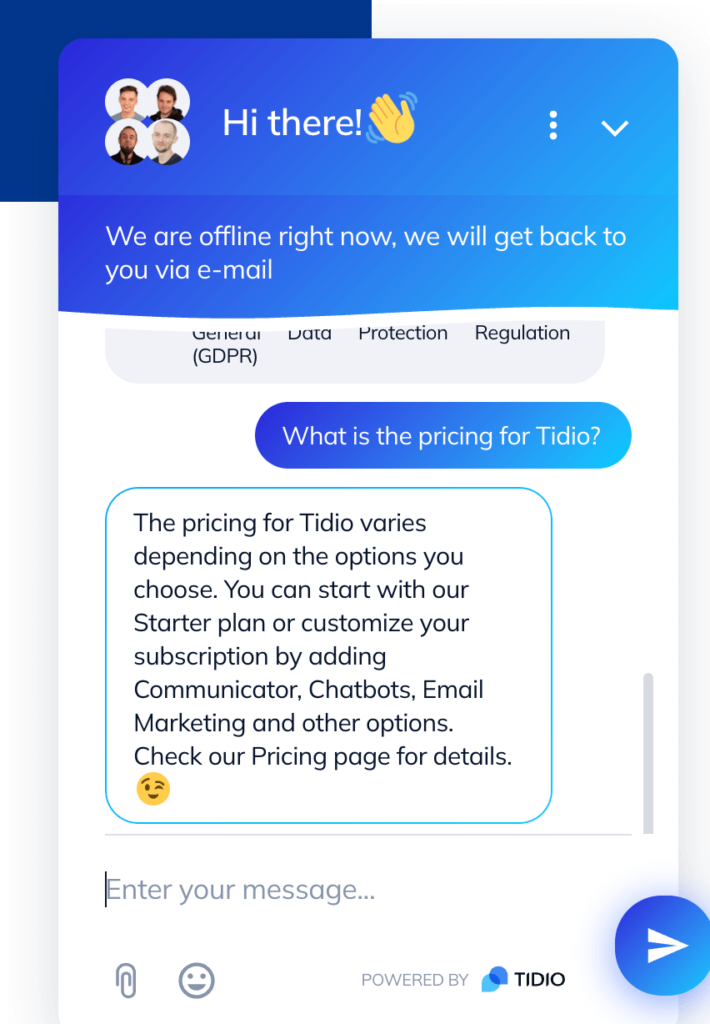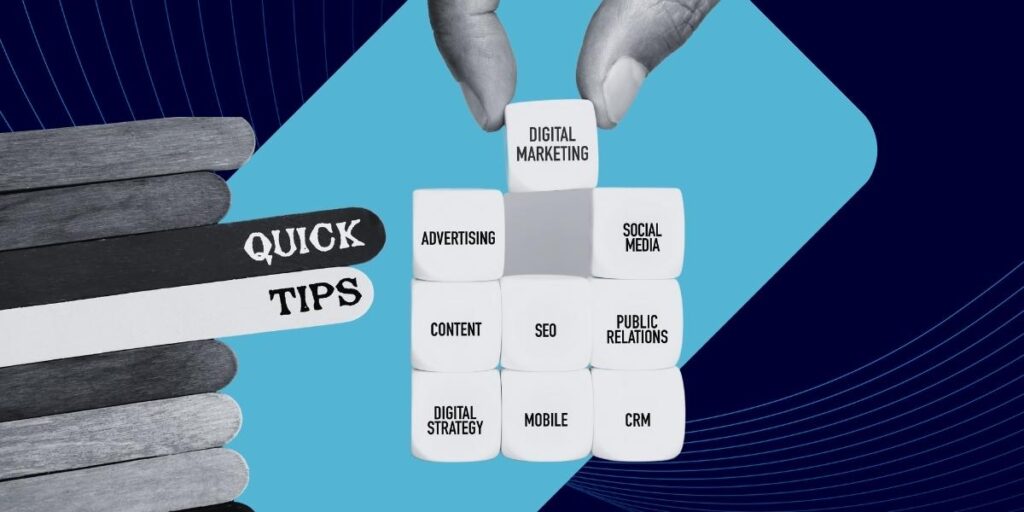In today’s fast-paced digital landscape, staying ahead of the curve is crucial for businesses to thrive. As technology continues to evolve, so does the field of digital marketing. To remain competitive, it is essential for marketers to keep an eye on emerging digital marketing trends and adapt their strategies accordingly.
In this comprehensive article, we will explore the future of digital marketing and highlight the top 10 trends to watch. From artificial intelligence to voice search, we will delve into the key areas that are shaping the industry and making an impact.
Top Digital Trends In Digital Marketing
So, let’s dive in and explore the exciting future of digital marketing, as we list the top 10 digital marketing trends in our blog. Read on!
1. Artificial Intelligence (AI) and Machine Learning
AI and machine learning are revolutionizing the way digital marketing operates. With the ability to analyze vast amounts of data and make intelligent marketing predictions, AI-powered tools, and algorithms are transforming various aspects of marketing. From personalized customer experiences to automated ad targeting, AI is driving efficiency and enhancing campaign performance. Businesses can leverage AI to gain insights, optimize content, automate customer interactions, and improve decision-making processes. As AI continues to advance, marketers who embrace this technology will have a competitive edge.
2. Voice Search Optimization
Voice search is becoming increasingly popular with the rise of smart speakers and voice assistants. As consumers rely on voice commands to perform searches, optimizing digital content for voice searches is essential. Marketers need to understand the nuances of voice search and adapt their SEO strategies accordingly. Long-tail keywords, natural language, and conversational tone are crucial for capturing voice search queries effectively. By optimizing for voice search, businesses can improve their visibility and reach a broader audience.
3. Video Marketing Dominance
Video has emerged as a dominant form of content consumption, and its significance in digital marketing is only growing. Brands are leveraging video marketing to engage their audience, tell compelling stories, and showcase their products or services. Platforms like YouTube, TikTok, and Instagram Reels offer immense opportunities for businesses to connect with their target market. From live streaming to interactive videos, incorporating video marketing into digital strategies is vital for success in the future.
4. Influencer Marketing Evolution
Influencer marketing has evolved from a mere trend to an integral part of many brands’ marketing strategies. Collaborating with influencers allows businesses to tap into their large, engaged audiences and build brand credibility. However, the landscape of influencer marketing is changing. Micro-influencers, who have smaller but highly targeted followings, are gaining prominence. Additionally, authenticity, transparency, and genuine partnerships are becoming crucial factors in successful influencer marketing campaigns.
5. Personalization and Customer Experience
In the future, personalization will continue to be a key driver of success in digital marketing. Consumers expect tailored experiences that cater to their unique needs and preferences. Marketers can leverage data and automation to deliver personalized content, recommendations, and offers. From personalized emails to dynamic website content, customization will play a pivotal role in enhancing customer experience and driving conversions.
6. Social Commerce Revolution
Social media platforms are increasingly becoming shopping destinations. The integration of e-commerce features within social media channels is revolutionizing the way consumers discover and purchase products. With shoppable posts, in-app checkout options, and augmented reality try-on experiences, social commerce offers a seamless path to purchase. Brands that effectively leverage social commerce will have a competitive advantage in the future of digital marketing.
7. Content Marketing Evolution
Content marketing will continue to be a powerful strategy, but its evolution is necessary to stand out in the digital clutter. Interactive content, such as quizzes, polls, and calculators, can provide engaging experiences and increase brand awareness. User-generated content and influencer collaborations can also enhance authenticity and social proof. Additionally, leveraging emerging formats like podcasts and virtual reality can help brands stay ahead of the curve.
8. Privacy and Data Protection
As concerns about data privacy grow, regulations like GDPR and CCPA are shaping the digital marketing landscape. Marketers need to prioritize data protection, transparency, and consent management. Building trust with customers by safeguarding their data will be essential in the future. Implementing privacy-focused practices and communicating privacy policies effectively can help businesses build strong customer relationships.
9. Augmented Reality (AR) and Virtual Reality (VR)
AR and VR technologies have immense potential to transform the way brands interact with their audience. From immersive product experiences to virtual showrooms, AR and VR can create engaging and memorable interactions. As these technologies become more accessible and affordable, incorporating AR and VR into digital marketing strategies will become increasingly common.
10. Data-Driven Decision Making
Data has always been crucial in digital marketing, but its significance will continue to grow. Marketers need to embrace data analytics and make data-driven decisions to optimize campaigns and drive results. With the help of AI and machine learning, businesses can gain valuable insights from data and refine their strategies continuously. Data-driven decision making will be the cornerstone of successful digital marketing in the future. It will help make practical marketing predictions so that business owners can take relevant steps to make their businesses grow.
Challenges and Opportunities of Digital Marketing
Digital marketing is evolving at a rapid pace and businesses need to keep up in order to stay competitive. Here are some of the challenges and opportunities of digital marketing that businesses should be aware of:
- The Ever-Changing Landscape of Digital Marketing: With new technologies and platforms emerging all the time, it can be difficult for businesses to keep up. It’s important to stay ahead of the curve and be willing to experiment with new platforms and strategies.
- Increasing Competition: As more businesses turn to digital marketing, the competition is becoming stiffer. It’s important to differentiate your business and stand out from the crowd.
- The Need for Data: In order to be successful with digital marketing, you need to have access to data so you can track your progress and measure your results. This can be a challenge for businesses that don’t have the necessary resources or expertise.
- Making The Most Of Limited Resources: Many small businesses don’t have large budgets for their digital marketing efforts. This means they need to be strategic in their approach and make the most of limited resources.
- Connecting with Customers Online: In a world where people are increasingly spending time online, it’s important for businesses to find ways to connect with their target audience through digital channels.
- ROI Benefits of Digital Marketing: Digital marketing is an essential part of any business’s marketing strategy, with a wide range of ROI benefits. One of the most important benefits of digital marketing is that it is relatively easy to measure ROI. This means that businesses can track and measure the performance of their digital marketing campaigns and make necessary adjustments to improve results. Additionally, digital marketing provides a number of other ROI benefits, including:
Increased Brand Awareness
Digital marketing helps businesses to reach a wider audience more easily and effectively than traditional marketing methods. This increased exposure can lead to improved brand awareness and recognition.
Improved Lead Generation
A well-executed digital marketing campaign will generate more leads than a traditional marketing campaign. Additionally, digital marketing techniques allow you to target your audience more precisely, which can result in higher-quality leads.
Higher Conversion Rates
The ability to track and measure results means that businesses can see which digital marketing techniques are working and adjust their campaigns accordingly. This improved focus often leads to higher conversion rates from leads to customers.
Reduced Costs
Digital marketing is often more cost-effective than traditional marketing methods, due to its increased efficiency and effectiveness. Additionally, businesses can save money by using automated processes such as email marketing and social media advertising.
Benefits to Companies Using Digital Marketing Trends
1. Connecting With Their Customers
Digital marketing is becoming more important for companies as they seek to connect with their customers online. In fact, a recent study found that nearly 60 percent of marketers believe that digital marketing will be more important in the next five years than it is today.
Some of the most popular trends that companies are using to connect with their customers include social media marketing, content marketing, and email marketing. These channels allow companies to reach out to their customers directly and build relationships with them. Additionally, these channels are relatively inexpensive, which makes them appealing for small businesses and startups.
Also read our blog: The Top Digital Marketing Trends to Watch Out for in 2023
2. Reaching Out to New Markets
As digital marketing becomes more widespread, companies are beginning to use it to reach new markets that they may have otherwise been unable to reach. For example, social media platforms like Facebook and Twitter allow companies to target users based on interests and demographics. This means that companies can specifically target their advertising toward individuals who are likely to be interested in what they have to offer.
Additionally, digital marketing can be used to reach international markets. For example, many Chinese internet users cannot access Google or Facebook due to government restrictions. However, there are a number of other social media platforms that are popular in China, such as Weibo and Youku. By targeting these platforms, companies can reach a whole new market of potential customers.
3. Improve Customer Service

Digital marketing is also being used to improve customer service. For example, many companies are using chatbots on their websites and social media platforms in order to provide faster and more efficient customer service.
Additionally, companies are using analytics tools to gain insights into customer’s behavior and preferences, which can help them refine their services and improve customer experience. Finally, companies are using automated email programs to stay in touch with customers and provide personalized messages that are tailored to their needs.
Tips and Strategies for Successful Implementation
There is no one-size-fits-all answer to the question of how to successfully implement digital marketing strategies, but there are some general tips and strategies that can help. Here are some of the most important things to keep in mind:
- Start with a clear goal in mind: What do you want to achieve with your digital marketing efforts? Be as specific as possible.
- Create a detailed plan of action: What steps will you take to reach your goal? Who will be responsible for each task? When will each task be completed?
- Make sure you have the right resources in place: Do you have the budget for paid advertising? Do you have the manpower to create and execute a social media campaign? Do you have access to the necessary data and analytics tools?
- Execute your plan flawlessly: Pay attention to every detail and make sure everything is executed perfectly. Remember, even small mistakes can have big consequences in the digital world.
- Monitor your progress and adjust your plans accordingly: Use data and analytics to track your progress and identify areas where you can improve. Regularly revise and update your plans to ensure that you are on track to achieve your goals.
How Can The Marketing Hawks Help SMEs & Mid-Sized Businesses Implement These Top Trends?
Following are a few ways our agency, The Marketing Hawks, can assist SMEs and mid-sized businesses in implementing these Digital Marketing Trends:
1. Strategic Planning
The Marketing Hawks can help SMEs and mid-sized businesses develop a comprehensive digital marketing strategy aligned with their goals and target audience. We can identify the most relevant trends and tactics to focus on based on the business’s specific needs and resources.
2. Trend Analysis and Research
Our agency can conduct thorough research and analysis of the latest digital marketing trends and provide insights on how these trends can be implemented effectively for SMEs and mid-sized businesses. This includes staying updated with industry changes, consumer behavior, and emerging technologies.
3. Customized Campaigns
The Marketing Hawks can create tailored digital marketing campaigns that incorporate the top trends for SMEs and mid-sized businesses. This involves leveraging various channels such as social media, search engine optimization (SEO), content marketing, email marketing, and paid advertising to reach the target audience effectively.
4. Website and User Experience Optimization
Our agency can optimize the business’s website for a better user experience, ensuring it is mobile-friendly, fast-loading, and user-friendly. We can implement SEO strategies to improve search engine rankings and increase organic traffic.
5. Content Creation and Distribution
The Marketing Hawks can assist in creating high-quality, engaging, and relevant content that aligns with the target audience’s needs and preferences. We can also develop a content distribution strategy to reach the right audience through various channels and formats.
6. Social Media Management
Our agency can help SMEs and mid-sized businesses establish a strong presence on social media platforms. This involves creating and managing social media profiles, developing a content calendar, engaging with the audience, and running targeted advertising campaigns.
7. Performance Tracking and Analytics
The Marketing Hawks can track and analyze the performance of digital marketing campaigns using various analytics tools. We can provide regular reports and insights on key metrics, enabling businesses to make data-driven decisions and optimize their marketing efforts.
8. Collaboration and Training
Our agency can collaborate with SMEs and mid-sized businesses to align marketing strategies with the business’s goals and values. We can also provide training and guidance to internal teams, empowering them to implement and sustain digital marketing trends effectively.
Conclusion
The future of digital marketing is exciting and full of opportunities for businesses that embrace emerging trends. From the integration of AI and machine learning to the rise of voice search and video marketing, staying ahead of the curve is essential.
By focusing on personalization, social commerce, and user experience, brands can connect with their audience on a deeper level. Additionally, adapting to changing privacy regulations, leveraging AR and VR, and making data-driven decisions will ensure success in the dynamic digital landscape. Embrace the future of digital marketing and position your business for growth and success.





